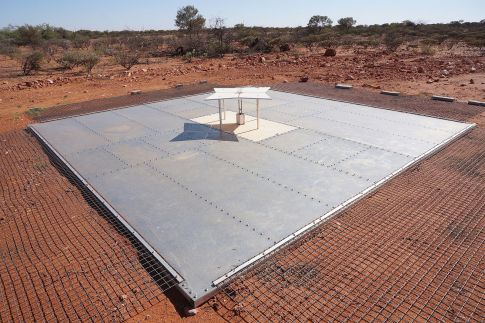
EDGES antenna, by Suzyj, Wikicommons
This month's podcast features the exciting discovery of signs of the first stars made by astronomers using the EDGES experiment, in Western Australia (right), published in Nature, in February. It's long been predicted that they should see such an indirect signal, which they picked up as a dip in the intensity of radiation in the cosmic microwave background (the afterglow of the big bang). But while this signal was where they thought it would be, and confirmed when they thought the first stars appeared -- some 180 million years after the big bang -- the detection raised new puzzles. The signal was far stronger than had been predicted. So, I spoke with cosmologist Rennan Barkana, of Tel Aviv University in Israel, who published a companion paper in the same edition of Nature, offering a possible solution: the boosted signal could be caused by an unexpected interaction with dark matter, in the early universe.
March 20, 2018
Remembering Stephen Hawking; light from the first stars in the universe, with Rennan Barkana; our place in the multiverse, with Eugene Lim; & setting up a science hostel in Maui, with Garrett Lisi.
Full Podcast
Next, reporter Sophie Hebden chatted to cosmologist Eugene Lim, of King's College London, about what we may be able to infer about observers in parallel universes. Lim, and his colleague Richard Easther, at the University of Auckland, are examining the possibility that we live in a multiverse of neighbouring cosmoses that each have different physical laws. But how likely is it that sentient observers will arise in those regions? What are the minimal set of physical properties needed for such observers to evolve? And what might our multiversal neighbours be able to measure? Answering such questions might help explain why our universe has the peculiar rules that it does. (You can read more about Lim and Easther's work in Sophie's article, "Our Place in the Multiverse.")
And, if you're wondering what we do when we're not podcasting, the answer, for Brendan Foster at least, is he enjoys relaxing in Maui. But on this holiday, he took some time to meet with theoretical physicist Garrett Lisi, who has opened a hostel for scientists to visit and spend time working. Listen now to hear Brendan's verdict on whether staying in such an idyllic location can be productive for research.
Finally, we've been away for a while. In the meantime, we saw the sad passing of two giants of theoretical physics, Joe Polchinski and Stephen Hawking. The latter died after we recorded the main edition, but we've added a few words to commemorate these huge losses. Both shall be missed.